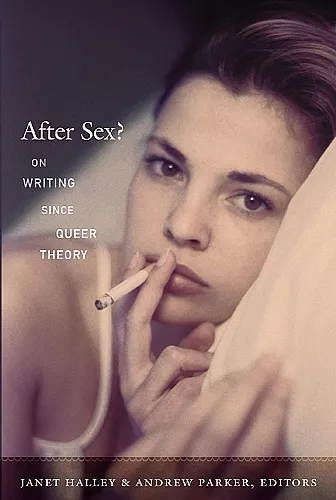After Sex?
On Writing since Queer Theory
Andrew Parker editor Janet Halley editor
Format:Paperback
Publisher:Duke University Press
Published:18th Jan '11
Should be back in stock very soon

Prominent participants in the development of queer theory explore the field in relation to their own intellectual itineraries, reflecting on its accomplishments, limitations, and critical potential
Since queer theory originated in the early 1990s, its insights and modes of analysis have been taken up by scholars across the humanities and social sciences. In After Sex? prominent contributors to the development of queer studies offer personal reflections on the field’s history, accomplishments, potential, and limitations. They consider the purpose of queer theory and the extent to which it is or is not defined by its engagement with sex and sexuality. For many of the contributors, a broad notion of sexuality is essential to queer thought. At the same time, some of them caution against creating an all-embracing idea of queerness, because it empties the term “queer” of meaning and assumes the universality of ideas developed in the North American academy. Some essays recall the political urgency of the late 1980s and early 1990s, when gay and lesbian activist and queer theory projects converged in response to the AIDS crisis. Other pieces exemplify more recent trends in queer critique, including the turn to affect and the debates surrounding the “antisocial thesis,” which associates queerness with the repudiation of heteronormative forms of belonging. Contributors discuss queer theory’s engagement with questions of transnationality and globalization, temporality and historical periodization. Meditating on the past and present of queer studies, After Sex? illuminates its future.
Contributors. Lauren Berlant, Leo Bersani, Michael Cobb, Ann Cvetkovich, Lee Edelman, Richard Thompson Ford, Carla Freccero, Elizabeth Freeman, Jonathan Goldberg, Janet Halley, Neville Hoad, Joseph Litvak, Heather Love, Michael Lucey, Michael Moon, José Esteban Muñoz, Jeff Nunokawa, Andrew Parker, Elizabeth A. Povinelli, Richard Rambuss, Erica Rand, Bethany Schneider, Eve Kosofsky Sedgwick, Kate Thomas
“At a moment when many had begun to worry that queer theory was becoming little more than a widespread litany of dogmas and slogans, this volume arrives as a wonderful surprise: not only because it reminds us what a contribution the varied intellectual currents grouped together under that rubric have been making—and for nearly twenty years now—to the renewal of our intellectual life; but also, and more importantly, because it shows to what a degree this theoretical effervescence lives on, and how powerfully productive it still is in all its characteristically marvelous variety.”—Didier Eribon, author of Insult and the Making of the Gay Self
“[A] a kaleidoscopic collection that rotates around the personal-is-political-is-personal axis of denormativization. . . . Queer theory, in short, is alive and kicking. Having proliferated, branched out, and, so far, resisted ossification, it provides space for diversity and disagreement. Testifying to this, the contributions to After Sex? make an illuminating and, yes, entertaining read.” -- Sylvia Mieszkowski * GLQ *
“[T]he value of After Sex? resides in its unwavering commitment to show how the nuances of queer theory aid in making it a powerful form of scholarship and politics. And this motley crew of interdisciplinary scholars reflects the exact kind of bricolage that Cultural Studies argues is productive. More importantly, this book insists that troubling the lenses through which we see the world is imperative if scholars ever want to make sense of a conjuncture that is so complexly intersectional.” -- Raechel Tiffe * Cultural Studies *
“Together, the essays that make up this collection offer an engaging insight into the origins, development, expansiveness and potential problems of queer theory. After Sex? does not provide a straightforward, conclusive answer to its own ambiguous question, but then it would be somewhat queer – or, rather, unqueer – if it did.” * Forum for Modern Language Studies *
ISBN: 9780822349099
Dimensions: unknown
Weight: 522g
336 pages